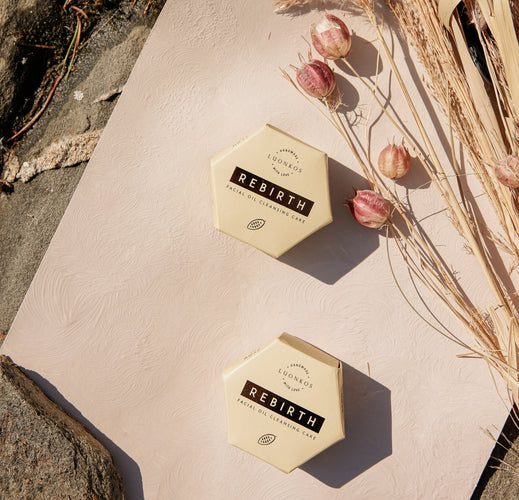Why does skin dry out in winter?
During the winter months, the humidity is lower both outdoors and indoors. When it is freezing outside, the humidity drops even more. At the same time, heating is used indoors, which further dries out the air and therefore the skin. This combination leads to the skin's natural moisture balance being disrupted, causing dryness and flaking, especially on the face.
The skin's protective layer needs water and fats to remain intact and flexible. When this protective layer weakens, the skin can lose moisture faster and become dry and sensitive to external stimuli.
Caring for dry skin in winter – tips and recommendations
Caring for dry skin in winter requires proper cleansing, moisturizing, and protection. The following tips will help prevent and treat dry skin on the face:
1. Use a gentle facial cleanser
The best facial cleanser for dry skin is a mild, moisturizing cleanser that doesn't strip your skin of its natural oils. Avoid harsh soaps and products containing alcohol, which can make dry skin worse.
Recommendation: Rebirth oil cleansing
The 100% natural oil cleansing cake is a true multi-purpose product! With oil cleansing, you can remove impurities, water-soluble and waterproof makeup, mascara, and even sunscreen from your face. It maintains the skin's moisture balance and leaves a protective oil layer on your skin.

2. Moisturize your skin regularly
Dry skin on your face needs effective hydration, especially in winter. Apply moisturizer or serum right after washing, while your skin is still slightly damp, to help the moisture bind better to your skin.
Tip: Choose an oil that is rich in natural moisturizing ingredients that are not too harsh on the skin.
Recommendation: Bliss Oil Serum
Nourishing and moisturizing oil serum for dry, sensitive and atopic skin. 100% natural and fragrance-free oil serum moisturizes, soothes and pampers the skin.
3. Protect your skin from frost
In the cold winter months, it's a good idea to protect your skin well before going outside. Use a thicker cream that creates a protective layer on the skin against cold and wind.
Remember: Also use lip balm and gloves to protect your skin from the cold.
Recommendation: Primal
Primal is a multi-purpose forest cream for the whole family, for example for chapped lips, cheeks, cracked cuticles, dry hands and feet. Its silky soft texture is very suitable for dry, atopic and irritated skin.

4. Avoid water that is too hot
Water that is too hot can dry out your skin even more. Use lukewarm water when washing your face and avoid long, hot showers.
Very dry skin on the face – how to treat it?
If your skin is very dry, simply using a moisturizer may not be enough. In this case, you should use special care products that help strengthen the skin's protective layer.
Recommended products for very dry skin:
-
Natural facial oils
-
Masks and serums – Use a hydrating mask once a week and add a serum to your daily skincare routine.
Frequently asked questions about treating dry skin in winter
Why does skin dry out in winter?
In winter, the air humidity is lower both outside and inside, which leads to the evaporation of moisture from the skin. The combination of frost and heating dries the skin quickly.
Why does cold weather dry out the skin?
In cold weather, the humidity level is low, which causes the skin to lose moisture. In addition, cold air can weaken the skin's protective layer, making the skin dry and more easily irritated.
How often should dry skin be moisturized in winter?
Dry skin should be moisturized at least twice a day – morning and night. You can also add moisturizer as needed during the day if your skin feels dry.
What are the most common causes of dry and flaky skin on the face?
The most common reasons are:
-
Cold and dry air in winter
-
Cleaning products that are too strong
-
Aging
-
Hereditary tendency to dry skin
-
Diseases such as atopy or psoriasis
What to do if nothing helps with dry skin?
If your extremely dry skin on your face doesn't improve with home remedies, you should see a dermatologist. It's possible that you have a skin condition that requires medical treatment.
Also remember that body skin care is just as important as facial skin care. The face is often given a lot of attention, but in winter it is important to remember to take care of your entire body! Read more HERE
Eczema, psoriasis and rosacea – common causes of flaky and dry skin
Scaly and dry facial skin can also be caused by various skin conditions, the most common of which are eczema, psoriasis, and rosacea. These conditions affect the skin in different ways, but they can all cause irritation, redness, and flaking.
What is eczema?
Eczema is a chronic inflammatory skin condition that can manifest as dry, itchy, and flaky skin. On the face, eczema often occurs in sensitive areas, such as around the eyes, forehead, or cheeks. Eczema can be caused by, for example:
-
Allergens, such as dust or pollen
-
Stress and hormonal changes
-
Irritants, such as strong soaps or cosmetics
Treatment usually focuses on moisturizing creams and avoiding potential irritants. In more severe cases, a doctor may prescribe corticosteroid creams or other medications.
Read more about eczema here
What is rosacea?
Rosacea is a chronic skin condition that causes redness, irritation, and sometimes pimple-like changes in the center of the face. Although rosacea does not typically cause significant scaling, the top layer of skin can become dry and flaky, especially if the skin is not properly moisturized or if overly harsh skincare products are used.
Rosacea triggers often include:
-
Hot or cold weather
-
Spicy food and alcohol
-
Stress and strong emotions
Rosacea treatment usually involves mild cleansers, moisturizing products, and medications such as creams containing metronidazole or, if necessary, oral antibiotics.
Read more about rosacea here!
What is atopic dermatitis and what causes it?
Atopic dermatitis, also known as atopic eczema or atopic dermatitis, is a chronic, itchy, and inflammatory skin disease that is caused by structural features of the skin and abnormal functioning of the immune system.
Atopic dermatitis is one of the most common skin diseases. In Finland, up to 25–30% of adults have suffered from atopic dermatitis at some point in their lives, which means over a million people (allergia.fi).
The tendency to develop atopic dermatitis is partly hereditary and is often associated with other atopic diseases, such as allergic rhinitis or asthma. Internal and external factors that can aggravate atopic dermatitis include:
-
Psychological factors and stress
-
Sweating and skin microbes
-
Food ingredients and cosmetics
-
Weather changes, such as dry or cold air
Treatment includes daily moisturizing of the skin, avoidance of irritants, and in more severe cases, medication, such as cortisone creams or medications that regulate the skin's immunity.
Eczema, psoriasis, and rosacea can all cause flaky skin on the face, but each condition requires an individualized approach to treatment. If your skin flaking persists or worsens, it's a good idea to see a dermatologist for a proper diagnosis and treatment plan.
Read more about atopic dermatitis here!
Caring for dry skin in winter requires regular moisturizing and the right products. Use gentle cleansers, avoid hot water, and remember to protect your skin from the cold. By keeping your skin care routine simple and protecting your skin's own barrier, your skin will stay soft and moisturized even on the coldest winter days!
Enjoy the outdoors! 💙-Luonkos team




